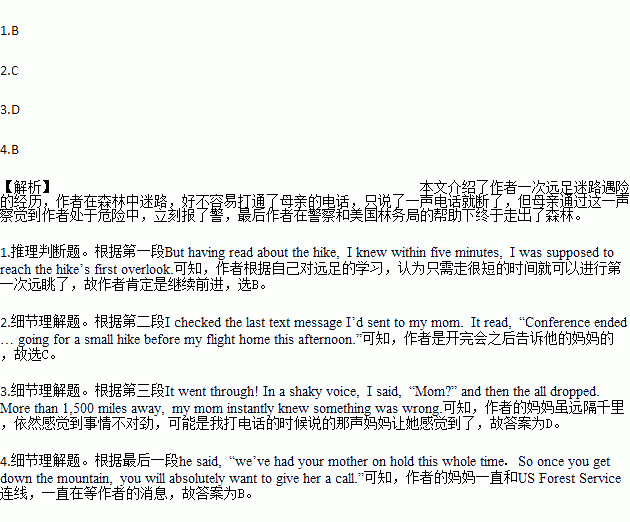题目内容
I had been following the yellowish-green markers for a “popular and easy” three-mile out-and-back hike. Immediately after the trailhead(山道的起点), the trail became very rocky and steep. But having read information about the hike, I knew within five minutes, I was supposed to reach the hike’s first overlook.
However, the overlook never arrived. Instead, I found myself lost in the woods. Pulling out my cellphone, I saw it read “no service”. I checked the last text message I’d sent to my mom. It read, “Conference ended…going for a small hike before my flight home this afternoon.” I put my phone away and kept moving and yelling, “Help! Is anybody out there?” Every so often, I’d stop to listen, but I never heard a reply.
I got out my phone again. The battery was running out fast as it searched for a signal. I struggled to find a place where I could get service. When I did, I called my mom. It went through! In a shaky voice, I said, “Mom?” And then the call dropped. More than 1,500 miles away, my mom instantly knew something was wrong. She called the Denver Police Department and was directed to the US Forest Service.
This was how I was introduced to John, an operator from the US Forest Service. Following John’s instruction on the phone, I finally escaped from the woods. I breathed a sigh of relief. Then my phone rang, and it was John, making sure I was still going in the right direction. “By the way,” he said, “we’ve had your mother on hold this whole time. We know once you get down the mountain, you will absolutely want to give her a call.”
1.What did the author do while finding the trail rocky and steep?
A. He yelled for help. B. He continued walking.
C. He returned to the start. D. He found the first overlook.
2.When did the author tell his mom about the hiking?
A. After he got lost. B. After John’s call.
C. After a conference. D. After the call dropped.
3.How did the author’s mom know he was in danger?
A. The author called and told her about it.
B. The author’s flight didn’t arrive on time.
C. She learned it from the US Forest Service.
D. She sensed something unusual on the phone.
4.What can we learn from the last paragraph?
A. The author’s mom was on line waiting.
B. John came to the woods for the author.
C. John lost touch with the author’s mom.
D. The author went in the wrong direction.


 l watchers.
l watchers. old on to tradition,and this also 9..(silent) marks them out from “the rest”.However,as for William and Kate,the 10..(decide) to dress George in shorts is more likely down to tradition than a class issue.
old on to tradition,and this also 9..(silent) marks them out from “the rest”.However,as for William and Kate,the 10..(decide) to dress George in shorts is more likely down to tradition than a class issue.